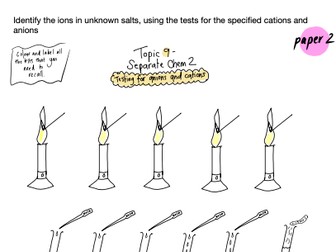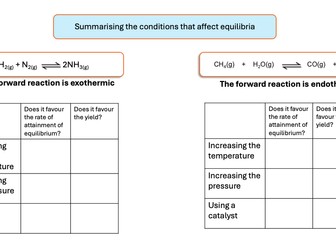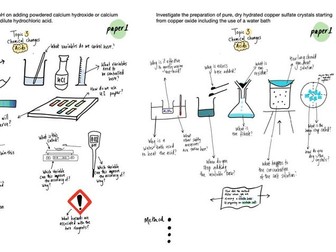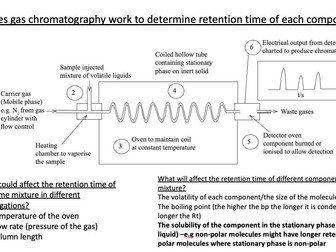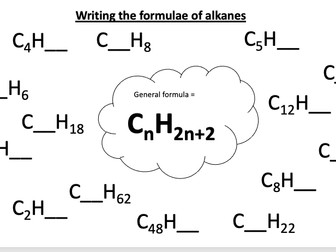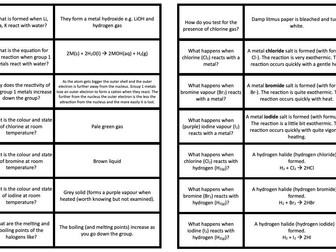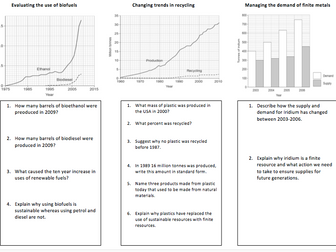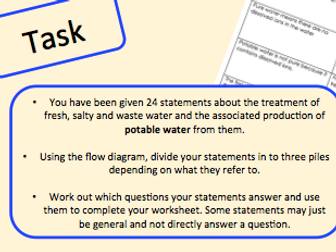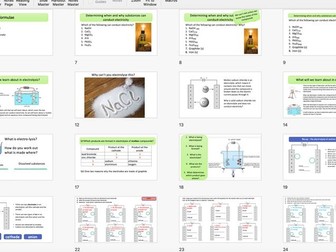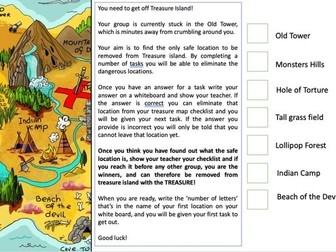Edexcel Chemistry Core Practicals Paper 2 only
<p>Paper 2 Core practicals guided revision. Ideas to think about in preparation for the exam. Students answer questions/recall methods/tests for ions. Helps focus methods and equipment and tries to think broader than the previous questions.</p>
Treating water and making water potable
<p>Edexcel GCSE - Topic 2 Treating water and making potable water.<br />
Lesson where students share information to complete very structured worksheet on potable water.</p>
<p>Starter- discuss types of water with a venn diagram.<br />
Main - Print out powerpoint slides and students go through classroom to collect answers on structured worksheet.<br />
Plenary Complete quiz on whiteboard in small teams.</p>
Dynamic Equilibrium activities to understand
<p>This lesson follows an explanation of dynamic equilibrium. A number of slides and activities are created to help students process and develop their understanding.</p>
<p>activities include:</p>
<ul>
<li>gap fill</li>
<li>discussion of true or false</li>
<li>model answers</li>
<li>determining effect on yield and rate of attainment for a number of scenarios (with answers attached).</li>
</ul>
Flash card revision Chemistry Paper 2
<p>Flash cards for Topics 6-9 for Edexcel GCSE Chemistry - Paper 2<br />
Short question and answer that can be made in to online questions, used to print out, folder over and test each other, cut on to cards… choices are endless. Matches the spec and very detailed.</p>
Topic 2 States of matter and mixtures flashcards Edexcel GCSE revision
<p>Topic 2 - Flashcards for Paper 1 GCSE Chemistry revision Edexcel. Can be folded over and used as QandA or printed/copied out on to flash cards to support focused learning.</p>
undefined
Core Practical Edexcel Chemistry GCSE revision resource - Revision Lesson
<p>Encourages students to think about each of the 8 Core Practicals. Clearly signposted with which exam paper each practical is on.<br />
Isn’t just ordinary method questions, relies on the students having an understanding of the method first.<br />
Good visuals help students to remember/recall practical tasks and pieces of equipment required.<br />
Considers control variables, some safety measures.<br />
Looks fantastic when stapled in to an A3 booklet for independent or guided revision activity/lesson/homework.</p>
TLC and Gas Chromatography
<p>Lesson focusing on Gas Chromatography and TLC.<br />
Explains how GC works and different types of techniques. PDF allows students to write notes.<br />
Excel Quiz can be uploaded to Kahoot or Socrative to have an online formative assessment. PDF of collated exam questions go alongside the lesson.</p>
Topic 8&9: Hydrocarbons and Crude Oil L1
<p>Covering Crude Oil and Fractional Distillation, as well as hydrocarbons and the structure of alkanes. Lots of tasks to do in the lesson (or two lessons) so students work alongside the teacher delivered powerpoint. Great for note taking or online resource too.<br />
Topic 8 and some of Topic 9 for Edexcel GCSE Chemistry.<br />
Also contains plenary quiz and each ppt slide with a task, activity and the answers provided.</p>
Topic 6 The Periodic Table Revision Flashcards Questions and Answers
<p>The Halogens, The Alkali metals and the Noble gases. A set of flash cards to help students learn key terminology to help them with Topic 6 Edexcel Chemistry (Paper 2). Fold the cards over to have the question on one side and the answer on the back.</p>
C10.1.1 Using the Earth's resources
<p>For C10.1 Using resources AQA Chemistry, Combined Science.<br />
Using the Earth’s resources C10.1.1<br />
For F students or weaker H students.<br />
Focusing on the use of data analysis and evaluating skills in the context of the Earth’s resources. Use the ppt to go through the graphs or alternatively students to use the worksheet to analyse the data for themselves.<br />
Three straightforward exam questions can be used as a plenary or homework.</p>
C10.1.2 Potable Water Required Practical Purifying water
<p>Two lessons of content - One activity to identify the production of potable water using statement cards.<br />
One lesson carrying out the Required practical on potable water.<br />
GCSE AQA Combined Science Chemistry Trilogy F/H<br />
C10.1.2 Treating water<br />
C10.1.2 Potable water</p>
Electrolysis - L1 Edexcel GCSE Chemistry Topic 3 Chemical changes
<p>Electrolysis lesson 1 - high achieving Year 10 students.<br />
Lots of questions and activities to complete.<br />
Some good explanations of half equations (intro) and what happens in an electrolytic cell.<br />
Good starter activity to introduce.</p>
Atoms, Ions, Isotopes differentiated revision collaborative lesson - Topic 1 Edexcel GCSE
<p>A differentiated, exciting and competitive revision task that covers the following:<br />
Linked to Edexcel Specification but suits AQA too</p>
<ul>
<li>History of the atom (slight extension on Edexcel)</li>
<li>Atomic structure</li>
<li>History of the periodic table</li>
<li>Isotopes</li>
<li>Isotopic abundance</li>
<li>Electron structure</li>
<li>Ion structure</li>
</ul>
<p>It is differentiated if you have more able students, ensure they get the group 5 slides as extra challenge here!</p>
<p>Students have to race off Treasure island by completing the tasks provided. Answers given too.</p>
<p>May take altering to suit your class and students.<br />
Great for students to work student led, and for collaboration/resilience</p>
What are buffers and how do they work?
Three worksheets to use. Split class into groups of three and label each member 'what', 'how' and 'why'. Then send members off to expert groups where they can access the worksheets and learn their specialism. Each member to then report back on what, how(pH) or why (eqb) to their original groups.
Empirical formula speed dating
A task that will allow you to differentiate between able and weaker students at the start of Y12. <br />
Half the class are dates (able), the other half are daters (less able). The dates help the daters through a series of calculations. The dates are then scored on how well they explained the application of the dating rules (calculation rules for empirical/molecular formula).
